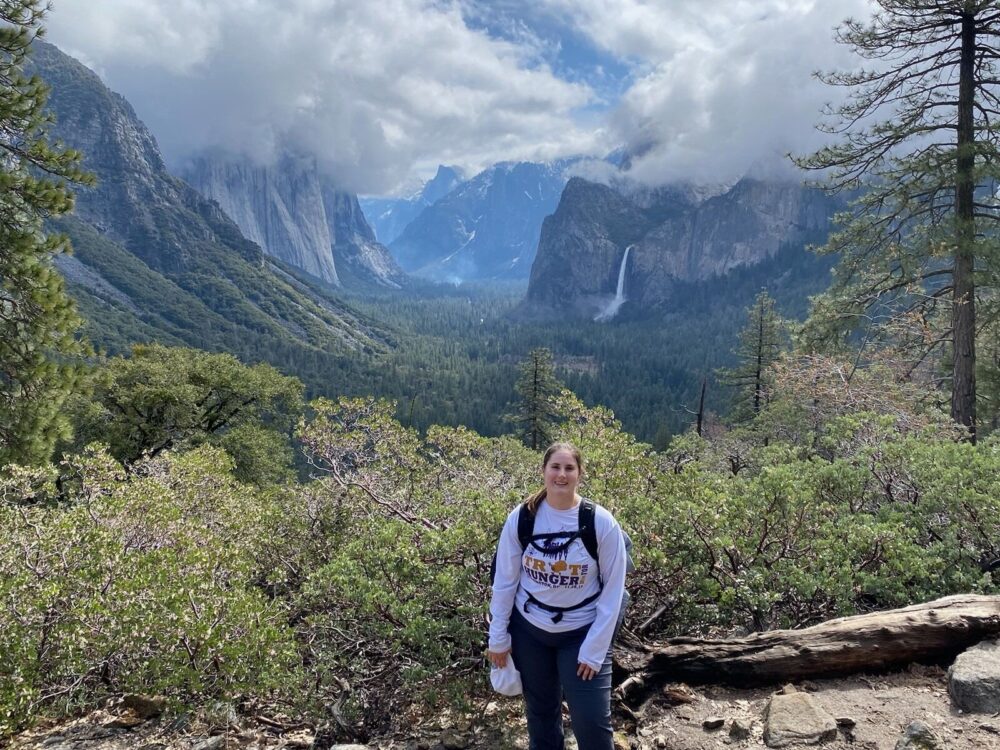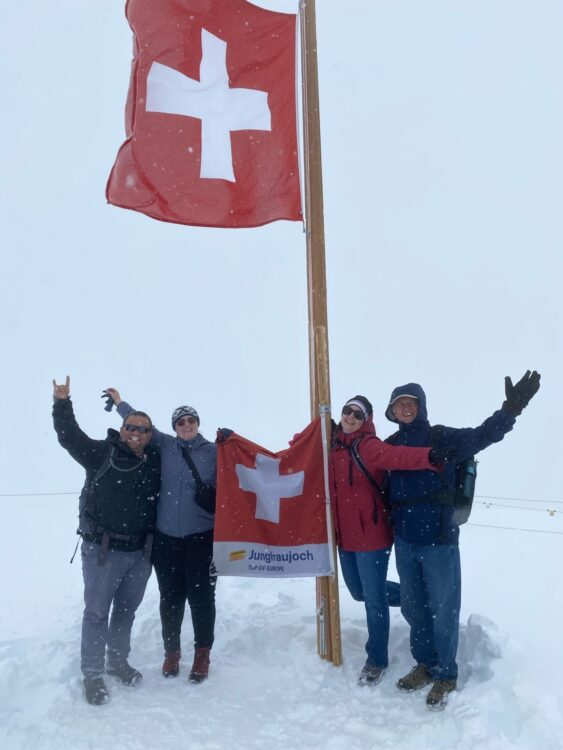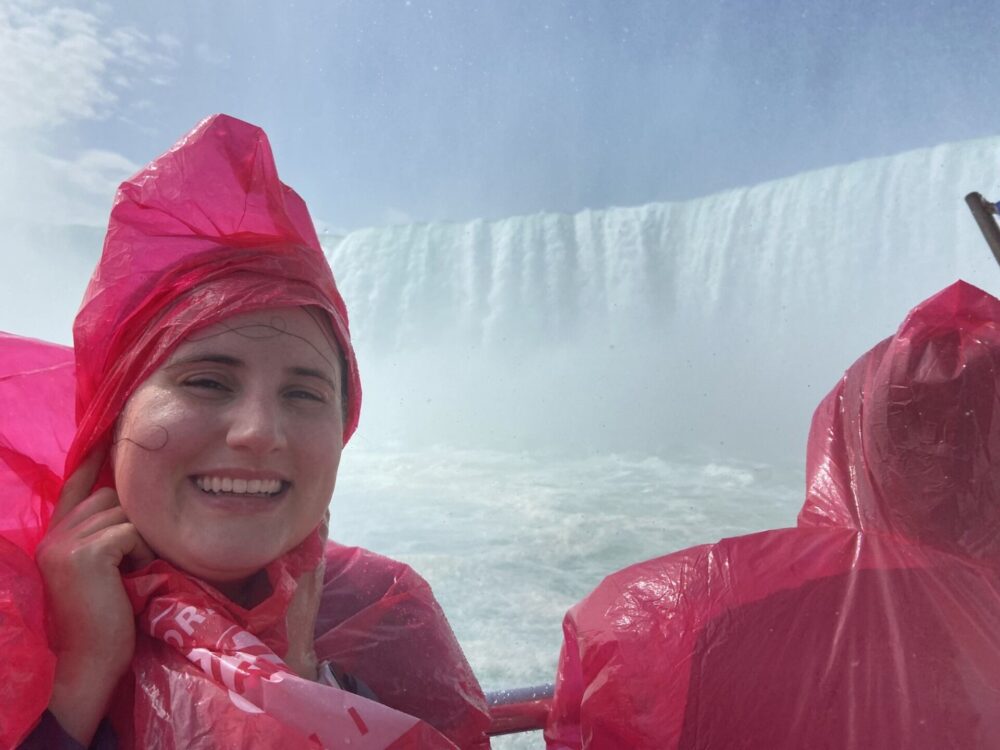Grace M. resides in Arlington, VA with her incredibly supportive husband and near her parents, with whom she is very close. She loves to host her family and friends so that she can experiment with new, intricate recipes and share exciting wine. You will always catch her with a flight to go on her next trip or plans to hike in Shenandoah National Park.
My diagnosis 
I was diagnosed in September 2023 with stage 4 (IV) lung cancer when I was only 27 years old.
I had a few weird symptoms in the months leading up to my diagnosis, including an incredibly sharp pain in my chest while I exercised and excessive swelling in my shoulder. The chest pain was pretty debilitating when I was doing cardio, but it was easy enough to write off as just being out of shape. However, when my shoulder swelled up like a water balloon, I was a little more concerned, but I assumed that it was just something wrong with my lymph nodes. Because I didn’t have any pain, I figured that going to urgent care was the best next step. They were unable to figure out what was going on, and they gave me a steroid shot and told me to go to the ER if it didn’t go down over the next couple of weeks.
A month or so later, the swelling reduced to a hard lump on my neck, so I decided to take myself to the ER. I felt fine otherwise though—no cough at all—and I wasn’t even nervous waiting to be seen. In fact, I remember my mom and I laughing and joking in the ER that day. We certainly didn’t consider that anything could be seriously wrong with me. The medical staff also didn’t seem to think anything could be wrong. I had my first CT scan of my neck, which showed necrosis, indicating it was either cancer or possibly autoimmune related. My family has a history of undiagnosed autoimmune disease, so we assumed it was that.
After my ER visit, I was referred to an ear, nose, and throat (ENT) doctor who did a biopsy. He called me 48 hours later, just 5 minutes before I was supposed to start work on a Friday morning, and told me that it was cancer. I learned from further testing that it was very advanced-stage lung cancer. I was beyond shocked. No one in my family ever had cancer before the age of 85, yet here I was—so young and feeling completely fine—being told I had stage 4 (IV) lung cancer. It felt impossible.
Treating my lung cancer 
I transferred my care to Georgetown—to the very best doctor we could find. He ordered biomarker testing. From that testing, I learned that I had ALK-positive lung cancer, and I started on the targeted therapy Lorbrena (lorlatinib). At the time, I had no idea what ALK-positive lung cancer was. The whole thing felt very futuristic and strange to me. Being able to just take these pills every day and never even look sick even though I have cancer is something I still think is so odd, although of course I also feel grateful for it. I have come to understand what good news it is to have ALK-positive lung cancer. It’s being very well researched and has some really effective treatments, with more on the horizon.
I have had some struggles with Lorbrena (lorlatinib), though. I started at the recommended FDA dose and experienced a lot of brain fog, moodiness, GI issues, and weight gain from it. I assumed the highest dose was the best dose and that since I was young, I would tolerate it well. I now understand that having a good quality of life is important too. We dropped my dose almost immediately, which helped a bit, and I went down again this past June. I feel really good now, which I hope continues for a very long time.
Fertility preservation
Right after I was diagnosed with lung cancer, and before I started taking Lorbrena (lorlatinib), I made the decision to go through egg preservation efforts so that I could keep option open for the future. Given the strict protocol for the length of time between stopping Lorbrena (lorlatinib) and conceiving, my doctor allowed me to delay treatment for a month. My egg retrieval was considered successful.
I was dating my long-term partner at the time, and we decided to elope and get married. We aren’t sure what the future will look like for us in terms of building a family, but we wanted to make sure that the choice was available if we wanted it.
The decision to have a child is a big commitment, and it’s one that you always assume you’ll be around for in the long term. My diagnosis makes that less certain for me, but I’m feeling good now, and I’m incredibly hopeful, as is my husband. We’re excited to make this decision when the time is right for us.
A new normal 
I am now over a year into my diagnosis and my husband and I are trying to figure out how to navigate our new life. When you’re first diagnosed, you live day to day and appointment to appointment. Now that I’ve had the disease for a while and my treatment has been going well, we’re starting to think about what we can plan for in the future. It’s an interesting exercise to determine how far into the future you feel comfortable thinking about and planning for while you’re living with advanced cancer.
My husband and I are big travelers. We’re not just thinking about where we’ll go in 2025, but even what our travel plans might be in 2026. That feels good to me, and that’s something I couldn’t imagine doing when I was first diagnosed. Right now, I’m comfortable looking ahead about a year or so, because that’s how long I’ve been living with lung cancer. I think when I hit 2 years, I’ll be able to plan 2 years out, and so on.
Therapy has been a tremendous help in managing these feelings. I’m a perfectionist, and it has been really hard to accept these big changes to my life and admit that things like how well I perform at work are sort of out of my hands due to brain fog. In therapy, we focus a lot on acknowledging the feelings that I’m having without letting them ruin my day. It’s helped me understand that it’s valid for me to have these feelings, but I also have to let them go.
Connecting with the lung cancer community
GO2’s Lung Cancer Voices Summit in March 2024 was the first event I’d done within the lung cancer community. I had no idea what to expect, but I felt like I needed to do it. I needed to get out there, meet other people with lung cancer, share my story, and start doing something proactive to help me feel like I wasn’t just moping in my room. It was such good timing for me to meet other people who understood me and what I was going through. I’ve since joined other support groups and attended other conferences and it’s always great experience.
I’ve also learned so, so much from other people living with lung cancer. Many of them know as much about the disease as the doctors who are treating us, and for someone like me who cares a lot about knowledge and about learning, it’s been amazing. At first, I wasn’t sure if I had a right to be in these survivor and patient spaces since I had been diagnosed so recently. I’m proud of myself for not letting my fears stop me from diving in anyway. The lung cancer community has been such a gift to me.
Register for GO2’s Lung Cancer Voices Summit in Washington, D.C. March 9-11, 2025.

Leave A Comment